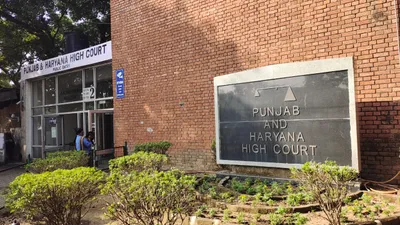
Punjab and Haryana HC Orders Fine and Compensation
The Punjab and Haryana High Court has taken strict action against the illegal cancellation of an MBBS aspirant’s admission. The Court imposed a ₹1 lakh fine on the Government Medical College, Amritsar, and its Principal. Additionally, the Punjab Government has been directed to pay ₹50,000 in compensation to the petitioner student, with the possibility of recovering the amount from the officials responsible for the error.
Court’s Ruling and Reasoning
The HC bench, comprising Chief Justice Sheel Nagu and Justice Sumeet Goel, stated that the fine was levied for wasting the Court’s time on an unnecessary case. The Court further clarified that the ₹50,000 compensation should be paid within two weeks, with the State having the liberty to recover it from the erring officials.
Petitioner’s Journey to Admission
After clearing the NEET UG 2024 exam, the petitioner was allocated a seat under the Freedom Fighters category in the Government Medical College, Amritsar, as part of the Government Quota. A provisional admission slip was issued on September 3, 2024, and after completing document verification, the petitioner received a final admission certificate.
Admission Cancellation and Legal Challenge
Despite the final admission certificate, the college raised objections after receiving clarifications regarding the petitioner’s eligibility under the Freedom Fighters category. The principal initiated a review based on a letter from 1995, which claimed that the benefits of this quota could not be extended to the adopted children of freedom fighters who already had biological children. This led to the cancellation of the petitioner’s admission on December 11, 2024.
Petitioner’s Argument Against Cancellation
The petitioner challenged the cancellation, arguing that all required documents, including a certificate confirming their status as the grandson of a freedom fighter, had been duly submitted and verified during the counseling process. The petitioner’s counsel also stated that administrative guidelines could not override statutory provisions, emphasizing that the cancellation was arbitrary and caused irreparable harm to the petitioner, especially as the NEET 2024 counseling period had expired.
State’s Defense and Principal’s Justification
The State’s counsel argued that the principal had initiated an inquiry after receiving a complaint about the petitioner’s eligibility. The inquiry revealed that the petitioner’s adoption deed mentioned that the adopting father had five daughters, and this led to a referral to the Department of Freedom Fighters. In response, the department cited a letter from 1995 that restricted benefits for adopted children, which the State argued applied to the petitioner.
HC’s Examination of the Reservation Criteria
The High Court reviewed the 2024 prospectus for MBBS/BDS admissions, which clearly outlined the reservation criteria. The Court noted that the reservation policy in the prospectus superseded the 1995 letter. It emphasized that the statutory rules in the prospectus were binding and could not be altered by administrative letters issued later.
Court’s Findings on Reservation Policy
The HC concluded that the reservation clause in the 2024 prospectus explicitly provided 1% reservation for children and grandchildren of freedom fighters, with no distinction between adopted and biological children. The Court referred to the Hindu Adoption and Maintenance Act, 1956, and previous case law, rejecting the argument that adopted children were ineligible for the quota.
Cancellation of Admission Quashed
The Court ultimately quashed the order cancelling the petitioner’s admission, stating that the decision to deny admission based on the 1995 letter was without merit. The Court also criticized the State’s handling of the case, urging the government to act in the best interest of its citizens and adopt a more responsible approach in legal matters.
The Court’s Criticism of State’s Conduct
The HC highlighted the inefficiency and indifference in the State’s approach, stressing the burden that frivolous litigation places on the judicial system. The Court pointed out that the State, being the largest litigant, should adopt a more responsible and diligent approach in legal matters to ensure justice is served.